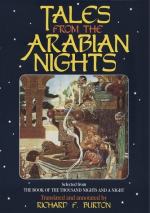[FN#213] Arab. “Najasah,” meaning anything unclean which requires ablution before prayer. Unfortunately mucus is not of the number, so the common Moslem is very offensive in the matter of nose.
[FN#214] Here the word “la’an” is used which most Moslems express by some euphemism. The vulgar Egyptian says “Na’al” (Sapre and Sapristi for Sacre and Sacristie), the Hindostani express it “I send him the three letters”—lam, ayn and nun.
[FN#215] The Mac. Edit. is here very concise; better the Bresi. Edit. (xii. 326). Here we have the Eastern form of the Three Wishes which dates from the earliest ages and which amongst us has been degraded to a matter of “black pudding.” It is the grossest and most brutal satire on the sex, suggesting that a woman would prefer an additional inch of penis to anything this world or the next can offer her. In the Book of Sindibad it is the story of the Peri and Religious Man; his learning the Great Name; and his consulting with his wife. See also La Fontaine’s “Trois Souhaits,” Prior’s “Ladle,” and “Les quatre Souhaits de Saint-Martin.”
[FN#216] Arab. “Laylat al-Kadr"= Night of Power or of Divine Decrees. It is “better than a thousand months” (Koran xcvii. 3), but unhappily the exact time is not known although all agree that it is one of the last ten in Ramazan. The latter when named by Kilab ibn Murrah, ancestor of Mohammed, about two centuries before Al-lslam, corresponded with July-August and took its name from “Ramza” or intense heat. But the Prophet, in the tenth Hijrah year, most unwisely forbade “Nasy"= triennial intercalation (Koran ix. 36) and thus the lunar month went round all the seasons. On the Night of Power the Koran was sent down from the Preserved Tablet by Allah’s throne, to the first or lunar Heaven whence Gabriel brought it for opportunest revelation to the Apostle (Koran xcvii.). Also during this night all Divine Decrees for the ensuing year are taken from the Tablet and are given to the angels for execution whilst, the gates of Heaven being open, prayer (as in the text) is sure of success. This mass of absurdity has engendered a host of superstitions everywhere varying. Lane (Mod. Egypt, chapt. xxv.) describes how some of the Faithful keep tasting a cup of salt water which should become sweet in the Night of Nights. In (Moslem) India not only the sea becomes sweet, but all the vegetable creation bows down before Allah. The exact time is known only to Prophets; but the pious sit through the Night of Ramazan 27th (our 26th) praying and burning incense-pastilles. In Stambul this is officially held to be the Night of Power. So in mediaeval Europe on Christmas Eve the cattle worshipped God in their stalls and I have met peasants in France and Italy who firmly believed that brute beasts on that night not only speak but predict the events of the coming year.
[FN#217] Hence the misfortune befel her; the pious especially avoid temporal palaces.




